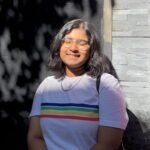cross·roads noun 1. an intersection of two or more roads. o a point at which a crucial choice must be made that will have far-reaching consequences.
Choices. All beings make choices, regardless of their power to do so. We make them because they eventually make us. We are given the power of choice, by a divine entity, and we make frequent use of it. We choose who to adore, what to betray, how to follow, where to go and when to do all of it. My story is the same, and yet is it not. You won’t hear it at a mosque after the Maghrib prayer, nor at a college party blasting pop music down the block – it can’t and won’t find a home in those lively places, because it is not the lightest one. Yet, it has been able to find a home – a broken, dejected home – inside the darkest crevices of my thoughts, and most importantly, my choices. Today, my identity has gathered up the courage and strength to be told, to be heard, to be felt, to inspire, but it did not always undergo an easy journey in doing so.
To come this far, I’ve had to make choices about who I was, who I am, and who I will be: a Queer, Muslim and Asian-American Woman. This is a mouthful, and I can’t blame anyone for having a hard time digesting all of it; after all, I’m still comprehending it myself, 8 years and counting. However, I haven’t always had the privilege of being my entire myself; if it was a dreadful Monday, I got up and picked my Asian identity out of the drawer and put on business casual outfit, because corporate America had its favorites when it came to ethnic minorities. If it was a busy Wednesday with a Dawat invite, a traditional and ethnic dinner party, I’d carefully handpick the Muslim label through the “modest” clothes I wore, the delicate smile on my face, and the lowered gaze. She was popular at the dinner parties, but she had never felt so empty within a 4-hour period of time.
Finally, Saturday came, and I could be who I had to fight the most for – my Queerness, that I never had the courage to parade around, but only express subtly. Through a small, rainbow enamel pin, a Human Right’s Campaign sticker on my laptop, the polaroid of my girlfriend and I inside my phone case, or my mother’s belief in my childish affinity for rainbow patterns. It was the littlest things that required choices, but my world came crashing down every time I had to make them.
My Muslim friends never had the capacity to understand what I was going through, since growing up in a homogeneous society meant that they could always see themselves in another person walking down the street. My queer friends were hardly religious, due to their own reasons, and I couldn’t burden them any further to understand the trauma that would only add onto theirs. In social gatherings, there was a clear distinction between those that were gay, and those that were Muslims – the gay ones were mostly Christian and white, and the Muslim ones were usually brown and Asian. Between them, I took my position as the grey area of separation. It was in those crowded moments where I felt the loneliest, even if I was laughing, eating, singing or dancing.
In those times, I felt like I was making the choice of inclusion through exclusion – my Muslim friends who kept asking me about a future boyfriend because I hadn’t told them about my current girlfriend, and my queer friends who could see the unspoken sadness in my eyes when we hear news about yet another LGBTQ+ person dying in an Islamic country. The choice to keep quiet in times like those were never my own, they had been pre-made for me, through society and traditions, in order to fit the criteria of surviving.
Somehow, I always took on the burden and responsibility for them and decided that it was best to keep them as far away from each other as possible. I built crossroads between them, and each day and for each circumstance, I would have to take a taxi to a destination that fit the occasion. As cliché as it sounds, it was solidarity and community that saved me from taking those constant taxi rides at my own personal crossroads. To find this community, I had to accept the merging of the crossroads I had created for myself and were obligated to. That meant embracing every part of me with equal adoration, acceptance and unwavering attention – and that meant tearing down the system of pick-a-personality schedules I had restricted myself to.
Community didn’t always mean being finding people who were exactly like me – it started with hijabi girls with big hearts, who believed Allah created and loved all his beings equally, it peaked when modern Islamic scholars and leaders preached equality and opened their arms non-traditional Muslims, and it found its core when I met other Queer, Muslim, Asian American women like myself, who struggled with the same feelings as I did, and eventually fell in love with one. I cannot tell anyone how this story of identity politics concludes, as I’m still waking up every-day and accepting and loving my entire self a little more than the day before. However, what I can guarantee is, when I get into that taxi from now own, I’ll be able to say, “take me to who I truly am: a Queer, Muslim, and Asian-American Woman.”


